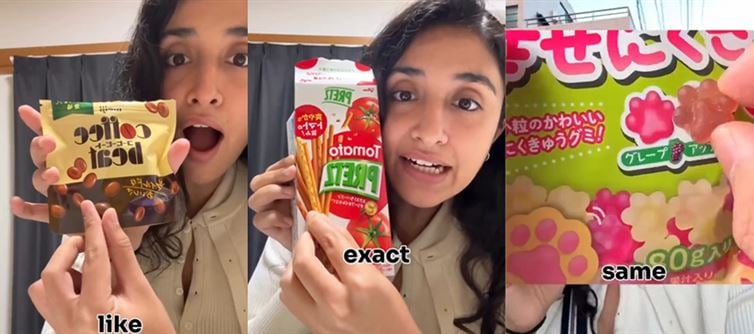
🍱WHERE PACKAGING TELLS THE TRUTH
In Japan, food packaging isn’t art — it’s a sacred promise.
Every photo, every description, every calorie count must reflect the exact reality of what’s inside.
If a label shows a perfectly golden croquette or a juicy piece of salmon, that’s exactly what you’ll find when you open it.
No exaggerated lighting.
No fake gloss.
No Photoshop dreams.
In Japan, even burgers don’t lie.
Meanwhile, in India, honesty expires faster than milk.
THE JAPANESE WAY: HONESTY YOU CAN TASTE
Japan’s consumer culture runs on trust and transparency.
Food companies face harsh penalties if they mislead customers — even slightly.
They don’t hide additives behind fancy names or disguise processed junk as “natural.”
They don’t need a 10-minute disclaimer to explain what’s actually inside your snack.
Because in Japan, the truth is part of the recipe.
It’s not about regulation alone — it’s about cultural integrity.
People grow up believing that misleading a customer, even with a picture, is a form of dishonor.
THE indian WAY: WHEN FAKE BECOMES NORMAL
Now let’s turn to India — the land of jugaad, not justice.
Our shelves are overflowing with fake paneer, fake ghee, fake honey, fake juices, and fake milk.
Even fruits are polished with wax.
And when you look at the packaging, it’s a carnival of deception —
juicy images of farm-fresh fruits that never met the inside of that Tetra pack,
claims like “100% pure” that don’t survive a single lab test,
and smiling farmers who are definitely actors from a stock photo site.
We’ve built an entire economy on optics over ethics.
🧀 THE GREAT indian FAÇADE
Everywhere you look, reality wears makeup.
“Natural” juices are 80% sugar water.
“Pure ghee” has palm oil.
“Organic” brands use chemical preservatives with fancier names.
“Dairy” sweets are made with synthetic fat and starch.
And the saddest part?
We’ve gotten used to it.
We don’t complain when paneer tastes rubbery or when honey crystallizes unnaturally fast.
We’ve normalized the fake.
So much so that when something genuine appears, we call it “premium.”
💸 HIGH PRICES, THIRD-WORLD QUALITY
What makes this hypocrisy sting deeper is that we pay first-world prices for third-world products.
A liter of milk costs nearly as much as in the West, but often isn’t even 100% milk.
A bag of chips costs ₹20, but you’re mostly buying nitrogen and air.
We pay extra for “fortified,” “natural,” or “organic,” but most of those claims are marketing mirages,
thinly veiled behind the excuse of “permissible limits.”
The indian consumer is overcharged, underinformed, and unprotected.
🧾 JAPAN’S SECRET INGREDIENT: ACCOUNTABILITY
In Japan, companies know that a single misleading label can destroy their reputation forever.
Their advertising laws are brutally strict.
Their food agencies are feared, not flattered.
And when something goes wrong — CEOs apologize publicly, not hide behind PR statements.
That’s what accountability looks like.
And it’s why Japanese consumers trust their system implicitly.
⚖️ INDIA’S TRUTH DEFICIT
In india, on the other hand, the watchdogs are often toothless, tangled in bureaucracy, or bought off by lobbyists.
FSSAI regulations exist, yes — but enforcement? Selective at best.
Raids happen only when scandals break.
And manufacturers continue to play chemical hide-and-seek with consumers’ health.
We’ve created a system where greed is rewarded and genuineness is punished.
🕯️ WHEN HONESTY BECAME A LUXURY
Authenticity has become a rare product in itself —
sold at boutique stores, labeled “farm-to-table,” and priced like it’s gold.
The ordinary indian, meanwhile, is forced to navigate a marketplace filled with half-truths and half-quality.
We don’t lack innovation or infrastructure —
We lack integrity.
💥 FINAL WORD: india DOESN’T NEED BETTER ADS — IT NEEDS A CONSCIENCE
Japan proves that honesty is the best branding strategy.
They don’t sell fantasies — they sell reality, beautifully done.
India’s problem isn’t creativity or technology.
It’s the rot of acceptance.
We’ve accepted that deceit is normal.
That shortcuts are smart.
That lying — just a little — is part of doing business.
But a nation that can’t tell the truth on a food label
will never find truth in its institutions.
Japan treats packaging like a promise. india treats it like propaganda.
And until that changes, we’ll keep living in a world where even the paneer isn’t real.




 click and follow Indiaherald WhatsApp channel
click and follow Indiaherald WhatsApp channel